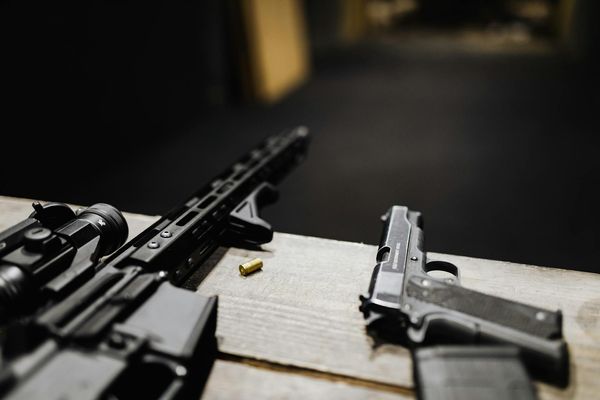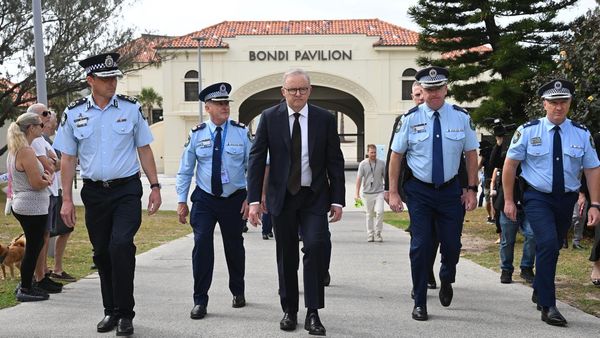
The family of the British-Egyptian activist Alaa Abd el-Fattah are demanding proof of life, after waiting hours in front of the desert prison where he is currently held, hoping to receive a letter that would provide information about his condition as he continues to refuse all food and water while delegates gather for Cop27 in Sharm el-Sheikh.
Abd el-Fattah has been on hunger strike for more than six months, and told his family shortly before the beginning of the UN climate conference that he would begin a water strike on Sunday. His letter from prison would indicate proof of life on his second day without water, after more than six months without more than 100 calories a day.
His mother, Laila Soueif, was “still waiting since the morning in front of the prison for a letter from Alaa”, his sister Mona tweeted in the late afternoon. “Still no sign of anything that could tell us he is fine, not hospitalised, let alone alive,” she said. She later added that Soueif continued to wait long after darkness had fallen and “the prison is locked down, no services left, nothing”.
As world leaders including the British prime minister, Rishi Sunak, arrived in Sharm el-Sheikh to begin negotiations to fight against the growing climate crisis, Abd el-Fattah’s case loomed large over the proceedings despite the Egyptian authorities’ efforts to distract from its human rights record through its role as host. Pressure mounted on Sunak to make good on his commitment to Abd el-Fattah’s family to resolve the case, even as observers grew concerned that his efforts might not be enough to save the detained activist.
James Lynch, a former British diplomat and the head of the human rights organisation Fair Square, who travelled with Abd el-Fattah’s youngest sister, Sanaa Seif, to Cop27, said: “I think it’s very clear that lots of people including at very high levels within the British government are personally invested in this case and see the injustice, the need for resolution and are working very hard. Yet there’s a gap here that remains – we still don’t know whether it’s being made clear that this case could have consequences for ‘business as usual’ relations with Egypt.”
Sameh Shoukry, Egypt’s foreign minister, who is also presiding over Cop27, rebuffed questions from CNBC about the potential impact that Abd el-Fattah’s case could have on the conference, as well as on relations with Britain. “I believe we should all concentrate on the task at hand, which is the priorities as they relate to climate change. We have deep bilateral relations with the UK,” he said.
Pressed on the issue of whether Abd el-Fattah’s potential death could overshadow proceedings, he replied: “I am confident that the prison authorities will provide the healthcare, the care that is available to all inmates.” He added that the Egyptian authorities had yet to recognise Abd el-Fattah’s dual nationality, after the democracy activist gained British citizenship last year through his mother while incarcerated.
Abd el-Fattah is a figurehead of Egypt’s 2011 uprising, whose writings on protests, technology and democracy have affected a generation across the Middle East, even though he has spent most of the past decade behind bars. Last year, he was sentenced to a further five years in prison for sharing a social media post about torture.
He began a hunger strike in April in protest at his detention conditions, which include the Egyptian authorities’ efforts to prevent British officials from visiting him. Abd el-Fattah is one of an estimated 65,000 political prisoners in Egypt’s labyrinthine detention system, which has also witnessed multiple high profile deaths in incarceration due to medical neglect, including of foreign nationals.
Another of his sisters, Sanaa Seif, also arrived in Sharm el-Sheikh on Monday morning after concluding a sit-in outside the Foreign and Commonwealth Development Office in London to demand urgent intervention to save her brother.
“Prime minister Sunak sent me a powerful letter on the weekend,” she said. “I think he intends to do everything he can to save Alaa; we’re pinning our hopes on him. I really believe that if he makes this an urgent political priority, my brother will be on the next flight to London.”
Sunak told Seif in a letter published a day earlier that he was “totally committed” to resolving the case, which he described as “a priority for the British government both as a human rights defender and as a British national”.
Sunak’s spokesperson said he met the Egyptian president on Monday and stressed “the UK government’s deep concern on this issue”.
“The prime minister said he hoped to see this resolved as soon as possible and would continue to press for progress,” he said.
Lynch pointed to other cases in which the British government had managed to free citizens detained abroad by making clear that the detention could affect the bilateral relationship. “That may be happening [here] privately, but it’s certainly not happening in public,” he said.
The UK is Egypt’s largest private trading partner, via fossil fuel giant BP and telecoms company Vodafone. Britain has also sold Egypt at least £24m in arms over the past three years, according to the group Campaign Against the Arms Trade, while British International Investment, the development arm of the FCDO, recently pledged more than £87m in investments in Egypt shortly before Cop27.
Abd el-Fattah’s case is already drawing focus from Cop27 despite Egyptian officials’ efforts. Tasneem Essop, the head of the Climate Action Network International, used her plenary address to the Cop27 hall to highlight Egypt’s crackdown on civil society and Abd el-Fattah’s case, saying: “Alaa Abd el-Fattah, the Egyptian prisoner of conscience, has escalated his hunger strike that started more than 200 days ago. He has stopped drinking water. His life is now in severe danger. We call for his immediate release and the release of all prisoners of conscience.”







